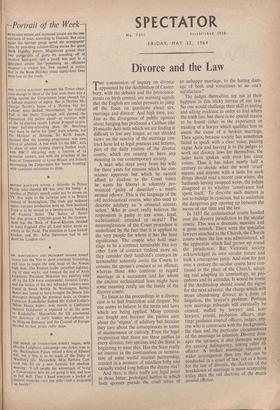Divorce and the Law
HE commission of inquiry on divorce I appointed by the Archbishop of Canter- bury, with the debates and the pronounce- ments on birth control, are warning signals that the English are under pressure to jump off the fence on questions about sex, marriage and divorce. And high time, too. Just as the divergence of public opinion about hanging has produced a Caliban (the Homicide Act) with which we are finding it difficult to live any longer, so our divided views on the sanctity of the marriage con- tract have led to legal postures and fictions, part of the daily routine of the divorce courts, which are ceasing to have any meaning in our contemporary society.
A man who stays away from his wife for three years for reasons which his con- science approves but which he cannot afford to disclose to the Court (since he wants his liberty) is solemnly pro- nounced 'guilty of desertipn'—a matri- monial offence. This is the language of the old ecclesiastical courts, who also used to describe adultery as 'a criminal conver- sation.' Who in court really believes the respondent is guilty in any sense, legal, ecclesiastical, criminal or moral? The meaninglessness of the Court procedure is underlined by the fact that it is applied to the very people for whom it has the least significance. The couple who hold mar- riage to be a contract terminable like any other form of contract (indeed more so; they consider their landlord's contract in- terminable) solemnly invite the Courts to censure the spouse's conduct as an offence; whereas those who continue to regard marriage as a sacrament and for whom the ancient ecclesiastical laws might have some meaning. rarely see the inside of the divorce courts.
To listen to the proceedings in a divorce case is to feel frustration and despair. No one seems to believe in the terms and laws which are being applied. Many contests are fought not because the parties care about the 'stigma' of adultery but because they care about the consequences in terms of maintenance or custody. Even the legal proposition that there are three parties to every divorce, two spouses and the State, is beginning to wear thin. Has the State really an interest in the continuation or termina- tion of some sordid marital partnership, created in a moment of mindless folly and casually ended• long before the decree nisi? And then, is there really any legal point in those bitter, prolonged battles in which both spouses parade the cruel trivia of an unhappy marriage, to the lasting dam- age of both and sometimes to no one's satisfaction?
The judges themselves are not at their happiest in this sticky terrain of our law.
No one would challenge their skill in testing and sifting evidence in order to find where the truth lies; but there is no special reason to be found either in the experience or training of a lawyer which qualifies him to assess the cause of a. broken marriage. Then again, because society has sometimes failed to speak with a clear voice, passing vague Acts and leaving it to the judges to work out divorce laws for themselves, the latter have spoken with even less clear voices. Thus it has taken nearly half a century to decide what the word 'cruel' means; and anyone with a taste for such things should read a recent case where, the husbands having swapped wives, the judges disagreed as to whether 'connivance had spent itself.' To describe such matters 4 not to indulge in cynicism, but to underline the dangerous gap opening up between the mores of our time and the law.
In 1857 the ecclesiastical courts handed over the divorce jurisdiction to the secular courts. This was a dramatic measure and a great wrench. There were the specialist lawyers attached to the Church, the Church courts where the law was administered, all the apparatus which had grown up round the jurisdiction. But Victorian society acknowledged its own secular nature and took a courageous jump. And now for just over a century the secular courts have con- tinued in the place of the Church, adopt- ing and adapting its terminology, its pro- cedures and its attitudes. It would be ironic if the Archbishop should sound the signal for the next advance, the charge which will mean abandoning divorce as a form of litigation, the lawyer's problem. Perhaps new marriage tribunals will eventually be created, staffed by lawyers and non- lawyers, priests, probation officers, mar- riage guidance council officers, judges, any- one who is conversant with the background, the class and the particular circumstances of the marriage in question. Divorce dam- ages the spouses; it also damages society (by causing delinquency, among other ill- effects). A broken marriage requires a wider investigation than any that can be conducted in a court of law; yet as a basis for the law of divorce, the doctrine of the breakdown of marriage is more acceptable today than the old doctrine of the matri- monial offence.


































 Previous page
Previous page